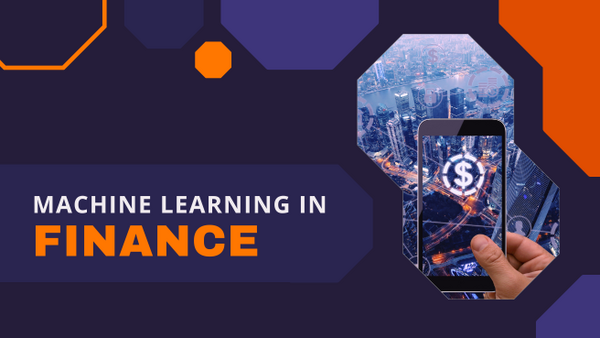In the dynamic world of finance, technological advancements have always played a pivotal role in shaping strategies, optimizing operations, and enhancing customer experiences. Among these technological innovations, Machine Learning (ML) stands out as a revolutionary force, fundamentally transforming the financial sector. As we delve into the nuances of how ML is redefining finance, it's essential to approach this subject with a deep understanding, drawing on real-life statistics, examples, and the potential it holds for future developments.
The Advent of Machine Learning in the Financial Landscape
The finance sector, known for its complexity and data-driven nature, finds a perfect ally in Machine Learning. ML algorithms excel in analyzing vast amounts of data, identifying patterns, and making predictions with minimal human intervention. This capability is crucial in a domain where precision and efficiency can significantly impact outcomes.
Risk Management: A New Frontier
Risk management, a critical component of finance, has been profoundly impacted by ML. Banks and financial institutions leverage ML algorithms to assess credit risk, thereby making more informed lending decisions. By analyzing borrowers' financial histories, transaction patterns, and even social media activities, ML provides a comprehensive risk profile. This holistic approach not only reduces the likelihood of defaults but also opens up new lending opportunities to previously underserved segments.
Algorithmic Trading: Speed and Precision
Algorithmic trading is another area where ML has made significant inroads. By analyzing historical data, news feeds, and market trends, ML algorithms can execute trades at optimal times, maximizing profits and minimizing losses. This high-speed, precise decision-making capability has given traders equipped with ML tools a competitive edge in the fast-paced trading environment.
Personalized Banking Services
Personalization has become a key differentiator in banking services, thanks to ML. From personalized investment advice to customized loan offers, ML enables banks to tailor their services to individual customer needs. This not only enhances customer satisfaction but also fosters loyalty and long-term engagement.
Fraud Detection and Prevention
ML's ability to analyze transaction patterns in real-time has revolutionized fraud detection in finance. By identifying anomalies that deviate from a user's typical transaction behavior, ML algorithms can flag potential frauds before they occur. This proactive approach has significantly reduced financial losses due to fraudulent activities.
The Integration of Machine Learning and Debt Consolidation
One of the most noteworthy applications of ML in finance is in the realm of debt consolidation. By analyzing an individual's financial situation, ML algorithms can recommend the best strategy for consolidating various debts into a single, manageable loan. This not only simplifies the repayment process but also potentially offers lower interest rates, making it a win-win for consumers. The use of ML in this context underscores the technology's potential to provide personalized financial solutions that can significantly improve financial well-being.
Real-life Success Stories: A Testament to ML's Potential
Across the globe, numerous financial institutions have harnessed the power of ML to drive innovation and efficiency. For instance, JPMorgan Chase's COiN platform uses ML to analyze legal documents and extract pertinent data, reducing a process that took hours to mere seconds. Similarly, American Express utilizes ML to predict fraudulent transactions with remarkable accuracy, safeguarding both the company and its customers against potential losses.
The Road Ahead: Challenges and Opportunities
Despite its impressive achievements, the journey of integrating ML into finance is not without challenges. Concerns regarding data privacy, algorithmic biases, and the need for robust regulatory frameworks are at the forefront of discussions. Addressing these concerns is crucial for fostering trust and ensuring the sustainable growth of ML in finance.
Moreover, as technology continues to evolve, the finance sector must keep pace with the latest advancements in ML. Investing in talent, research, and development is essential for harnessing the full potential of this transformative technology.
Financial Advisory Services: A New Age of Investment Strategies
The application of ML in financial advisory services has led to the development of sophisticated robo-advisors. These automated platforms use algorithms to provide personalized investment advice to users, taking into account their financial goals, risk tolerance, and investment timeline. By leveraging ML, robo-advisors can continuously learn from market trends and individual portfolio performances, thereby optimizing investment strategies to maximize returns. This democratization of financial advice makes investment more accessible to a broader audience, encouraging a culture of informed investment among the masses.
Regulatory Compliance: Ensuring Integrity and Trust
The financial industry is one of the most heavily regulated sectors, where compliance with laws and regulations is paramount. ML plays a critical role in enhancing regulatory compliance, making the process more efficient and less prone to human error. By automating the monitoring and reporting processes, ML algorithms can detect anomalies that may indicate non-compliance or fraudulent activities, ensuring that financial institutions operate within legal boundaries. This not only protects consumers but also builds trust in the financial system.
Enhancing Customer Engagement through AI-driven Insights
ML also significantly enhances customer engagement by providing financial institutions with deeper insights into customer behavior and preferences. By analyzing transaction data, social media interactions, and other digital footprints, ML algorithms can identify trends and predict customer needs. This enables banks and financial services to offer timely and relevant products, from loan offers to savings plans, thus enriching the customer experience. Personalized financial health reports, generated through ML analysis, empower customers with actionable insights, fostering a proactive approach to managing their finances.
Overcoming Challenges: Ethical Considerations and Skill Development
As ML continues to reshape the finance sector, it's essential to address the ethical considerations surrounding data privacy and algorithmic transparency. Ensuring the ethical use of data and building algorithms that are fair and unbiased is paramount. Moreover, as ML technologies advance, there is a growing need for skilled professionals who can develop, implement, and manage these systems. Investing in education and training to build a workforce adept in AI and ML is crucial for sustaining innovation and maintaining a competitive edge.
Conclusion: Charting a Course for a Tech-driven Financial Future
The integration of Machine Learning in finance is not just a trend but a fundamental shift towards a more efficient, transparent, and customer-centric financial ecosystem. The technology's potential to revolutionize risk management, trading, banking services, and fraud detection has already been demonstrated. However, its future applications, especially in enhancing financial advisory services, ensuring regulatory compliance, and driving customer engagement, hold even greater promise.
As we look forward, the challenges of ethical use, data privacy, and skill development need to be addressed to fully realize the benefits of ML in finance. By fostering a culture of continuous learning, ethical technology use, and regulatory innovation, the finance sector can navigate these challenges successfully.
The transformative impact of Machine Learning in finance is clear, and its future is bright. As the sector continues to evolve, embracing ML and AI technologies will not only drive financial innovation but also enhance the overall financial health and well-being of individuals and businesses alike. The journey ahead is filled with opportunities to redefine finance for the better, making it more accessible, efficient, and tailored to the needs of the digital age.



